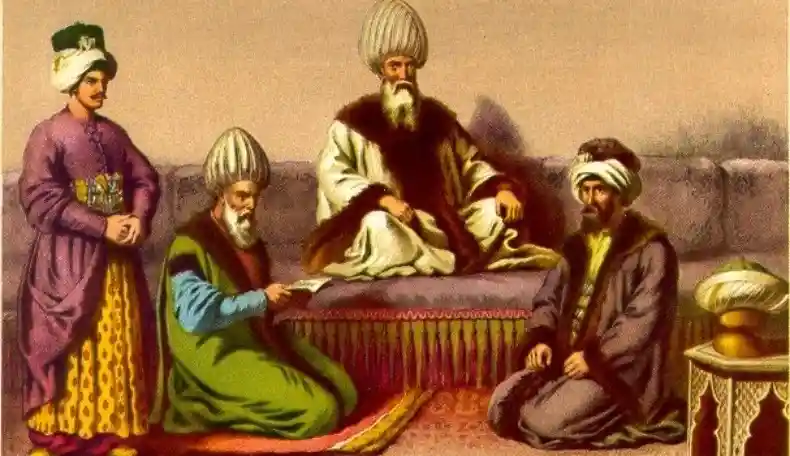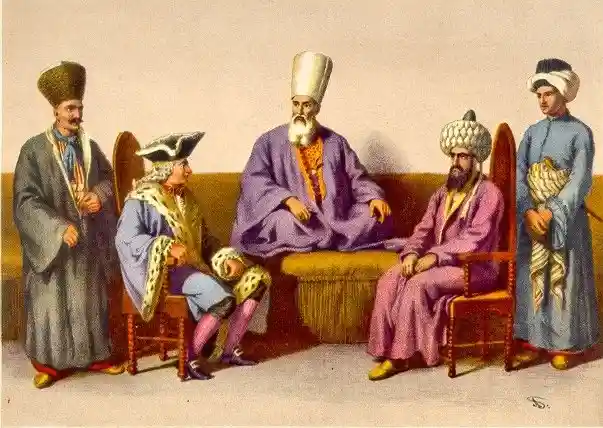One of the periods that can be called the golden age of the Ottoman Empire is undoubtedly the reign of Suleiman the Magnificent. Suleiman’s viziers mark a period of time when the empire experienced great development and wealth in the political, military and cultural fields. However, behind the success of Suleiman the Magnificent was not only a single leadership, but also a series of talented and loyal viziers who were close to him and managed the affairs of the state.
The viziers of Suleiman were perhaps one of the most important figures in the Ottoman Empire during his rule. These individuals not only gained the trust of Sultan Suleiman, but also contributed to important transformations of the period, such as the expansion of the empire, legal reforms, and the golden age of art. They not only carried out the sultan’s orders, but also played important roles in the administration of the empire with their own talents and knowledge.
The viziers of the Kanuni were not only political advisors or administrative officials, but also influential in various areas of the empire. The viziers of this period included a variety of great statesmen, jurists, and diplomats. Each worked with their own expertise and experience to protect and expand the interests of the empire.
The viziers of Suleiman the Magnificent not only shaped the political and military successes of the Ottoman Empire during its time, but also supported the cultural and intellectual vitality of the empire. During this period, literature, architecture, music and other branches of the arts developed greatly, and the viziers did not withhold their support in these areas either.
However, the viziers of Suleiman the Magnificent do not only represent a period of success, they also faced internal and external challenges to the empire. They had to contend with various difficulties such as political intrigues, foreign wars and internal rebellions. However, despite these difficulties, the viziers of Suleiman the Magnificent fought to maintain the stability and power of the empire through their loyalty, skill and leadership.
In conclusion, the success of the Ottoman Empire during the reign of Suleiman the Magnificent was not only due to a single leader, but also to a number of talented and loyal viziers who stood by him and played important roles in the administration of the empire. Suleiman’s viziers not only managed the affairs of the state, but were also the driving force behind developments in various areas of the empire. Their loyalty, wisdom and leadership laid the foundation for the great successes of the Ottoman Empire during this period, which is called the Golden Age.

Viziers of Suleiman the Magnificent: Architect of the Ottoman Empire’s Glorious Era
One of the periods considered as the golden age of the Ottoman Empire in history is undoubtedly the reign of Suleiman the Magnificent. Behind the successes of this period is not only the leadership of Sultan Suleiman, but also a series of talented and loyal viziers who stood by him and played important roles in the administration of the empire. Here is an examination of those important viziers who were influential during Suleiman’s reign and were among the architects of the glorious period of the Ottoman Empire:
- Piri Mehmed Pasha : Piri Mehmed Pasha, who has an important place in Ottoman history, served as the Grand Vizier of Suleiman the Magnificent. During his time as Grand Vizier, he made efforts to ensure the political stability of the empire and contribute to its expansion. He is also known for his efforts in bureaucratic reforms and the provision of justice.
- Ibrahim (Pargali) Pasha : One of Suleiman the Magnificent’s most trusted viziers, Ibrahim Pasha left a great impact throughout his reign. He was successful in both military and administrative fields and contributed to the expansion of the empire. However, his execution as a result of palace intrigues while he was the Grand Vizier is remembered as one of the most tragic events of his period.
- Ayas Mehmed Pasha : Ayas Mehmed Pasha, one of the important statesmen of the Kanuni period, served as the Grand Vizier for a period. He made efforts to strengthen the eastern borders of his empire and played an important role in Ottoman-Russian relations.
- Lütfi Pasha : One of the viziers of Suleiman the Magnificent, Lütfi Pasha worked effectively in both the military and diplomatic fields. He played an important role in the Ottoman Empire’s relations with Europe and was considered one of the leading statesmen of his time.
- Hadım Süleyman Pasha : Hadım Süleyman Pasha, who undertook important duties during the reign of Kanuni, played an influential role in both domestic and foreign politics. He took important steps to ensure the security of the southern borders of his empire and played an important role in Ottoman-Mamluk relations.
- Rüstem Pasha : One of the most powerful viziers of the Ottoman Empire, Rüstem Pasha was the son-in-law of Suleiman the Magnificent and served as Grand Vizier for many years. He played an influential role in both domestic and foreign policy and contributed to the expansion of the empire.
- Kara Ahmed Pasha : Kara Ahmed Pasha, who undertook important duties during the reign of Suleiman the Magnificent, worked effectively in both the military and administrative fields. He took important steps to ensure the security of the southeastern borders of his empire and played an important role in Ottoman-Iranian relations.
- Semiz Ali Pasha : Semiz Ali Pasha, who was effective during the reign of Suleiman the Magnificent, worked successfully in both military and administrative fields. He took important steps to ensure the security of the western borders of his empire and played an important role in Ottoman-Venetian relations.
- Sokollu Mehmed Pasha : One of the most influential viziers of the Ottoman Empire, Sokollu Mehmed Pasha served as Grand Vizier for many years and contributed to the expansion of the empire. He played an important role in Ottoman-Russian relations and worked effectively in the internal affairs of the empire.
These valuable viziers represented the power and glory of the Ottoman Empire during the reign of Suleiman the Magnificent. Their leadership, loyalty and talents formed the basis for the success of this period, which is considered the golden age of the empire.
The reign of Suleiman the Magnificent is one of the most brilliant and impressive periods of the Ottoman Empire. The developments and riches experienced by the empire in political, military and cultural fields during this period were made possible by the leadership of Suleiman the Magnificent and the contributions of the loyal and talented viziers who stood by him.
The viziers of Kanuni not only managed the affairs of the state, but also had influence in various areas of the empire. Great statesmen such as Piri Mehmed Pasha, Ibrahim Pasha, Ayas Mehmed Pasha, Lutfi Pasha, Hadim Suleyman Pasha, Rustem Pasha, Kara Ahmed Pasha, Semiz Ali Pasha, and Sokollu Mehmed Pasha worked selflessly for the security, prosperity, and expansion of the empire.
The viziers of Suleiman the Magnificent fought to protect the eastern borders of the empire, strived to ensure justice, and played an important role in the Ottoman’s international relations. Their leadership further consolidated the empire’s power and glory.
However, the viziers of Suleiman the Magnificent do not only represent a period of success, they also struggled with internal and external challenges of the empire. They faced various difficulties such as political intrigues, foreign wars and internal rebellions. However, despite these difficulties, the viziers of Suleiman the Magnificent fought to maintain the stability and power of the empire with their loyalty, skill and leadership.
In conclusion, the success of the Ottoman Empire during the reign of Suleiman the Magnificent was not only due to a single leader, but also to a number of talented and loyal viziers who stood by him and played important roles in the administration of the empire. Suleiman’s viziers not only managed the affairs of the state, but were also the driving force behind developments in various areas of the empire. Their loyalty, wisdom and leadership laid the foundation for the great successes of the Ottoman Empire during this period, which is called the Golden Age.
